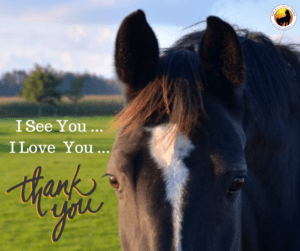About motivation: how much credit do you have on the Relationship Account with your horse?
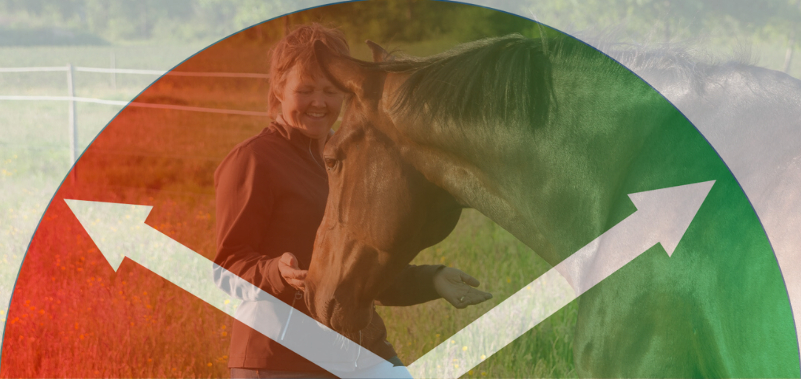
Lees je dit liever in het Nederlands? Kijk dan HIER
There’s nothing wrong about a bit of ambition … as long as your horse WANTS to join your game
I would love to do all kinds of fun stuff with my horses. I would love to ride them. I would like them to develop healthy biomechanics. I would like to ride dressage, to jump, to play at liberty, to go on the trails and more. Above all I want to have a great time together with my horses.
How my horses feel about it matters!
How my horses feel about me also matters to me … a lot! With everything we do I like to keep in mind that they did not ask for all of this. They have no idea whatsoever about my wishes and ambitions. They do not have a choice. They do not value prizes in competition, share my ambitions or understand the imaginary importance of ‘keeping up appearances’. They owe me nothing!
How much credit does my horse give me?
Both me and my horses do not like to be forced into something. Still I am sometimes a bit intense or persistent when trying to teach them something new, to improve their physical fitness or to change their biomechanical patterns. It would make me sad though, if my horse would not want to be with me anymore after such an occasion. I always strive to have enough credit on our relationship account to allow some room for asking the extra effort, either mental or physical.
I never want to get below zero, in the red zone. So I need to make deposits into the relationship account on a regular basis. In other words: we do things that makes my horses feel good. So often and so much that he clearly stays interested in being with me and in the things we do together, even when I ask a bit more effort sometimes.
If it was about money … how much can you afford?
Do you consider the state of your bank account before you buy something?
If you saved a bit you have something extra to spend. On the other hand: How does if feel if your account is negative and you have nothing left to spend? Does it cause stress or frustration? Does it keep you from your sleep when you are in debt?
I think we all agree that it’s smart to economise before your account hits zero, and that it feels good to save something extra to play around with.
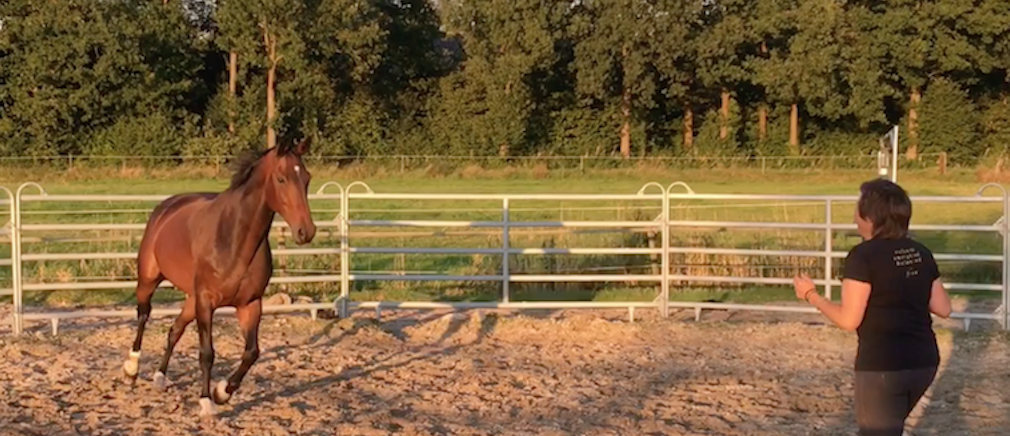
Your horse will tell you about the balance of your Relationship Account
Signs of plenty credit (green)
Your horse is curious and happy to apply effort. He shows a lot of try, is mentally engaged, offers initiative and sometimes offers even before you ask. He follows you freely and comes to meet you in the pasture.
Signs of increasing credit (light green)
Your horse is attentive, relaxed, responsive, greets you with a soft voice and does not walk away when you approach him in the pasture.
Signs of decreasing credit (light red)
Your horse shows lack of effort and interest, is slow in his responses or shows signs of tension or anxiety. He does not (try to) understand, is not relaxed or interested enough to think or reacts instinctive on your aids (with flight, fight, freeze of f***you). You have to work hard to get him to do what you want.
Signs of being indepted to your horse (red)
Repeated refusal, anger or fear. He gives up, is afraid to make mistakes or is in a state of learned helplessness. He turns away from you when you approach him and wants to avoid being saddled or groomed. Even when this behaviour is caused by somebody else, it can be you who has inherited the debts!
Making deposits into the Relationship Account on a regular basis
Everybody with horses will be confronted with all of the signals above in some way at some moment. Good and bad, small or substantial, occasional or structural. Sometimes it is a moment in time but if a certain behaviour shows up more often it becomes a tendency or even structural pattern. So we need to be aware in the Here&Now, because the balance of your Relationship Account is dynamic. It changes all the time when you are together with your horse. In the long run we want to develop lots of credit and stay in the green zone as far a possible. Every session with your horse should ideally add to the balance. On that day and for the longer term, increasing the bond with your horse over time.
What can you do?
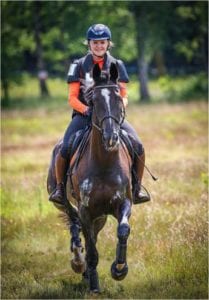
-
- Know your horse! Know what makes him happy. Grazing, treats, voice rewards, scratches, resting, running, playing, touching, chewing on something, standing on something or simply doing nothing together. Not every horse likes the same things and it can change with the situation. Lots of horses do not really like to be petted on their face. Stressed horses usually do not value treats a lot and centainly cannot keep their feet still to rest. Slow horses on the other end probably love to stand still and rest, while playful horses like to jump and play!
-
- Find a fair balance between your own ambitions and what is really important to you horse. If you want to make fast progress in educating or training your horse and you ask your horse to intensify his effort you can expect loosing credits with him. If you do not compensate this by doing something for the horse you can expect your progress to slow down or even get stuck. So every day do something for your horse too. You never want to get into the red zone!
-
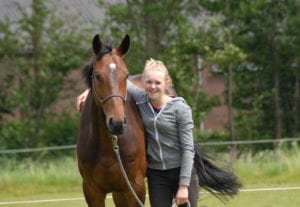 This is personal. Horses know who is who. This is about the personal relationship account between you and your horse. His relationship with you is not the same as with your co-rider, groom, sister or anybody else. Just like the relationships between people. For one person you’ll do just about anything to please or help, while for the other you would not feel inclined to put in any effort. If you lose credits with your horse you cannot ask somebody else to compensate for this. If you want a lot of effort from your horse, you have to restore the balance on the relationship account!
This is personal. Horses know who is who. This is about the personal relationship account between you and your horse. His relationship with you is not the same as with your co-rider, groom, sister or anybody else. Just like the relationships between people. For one person you’ll do just about anything to please or help, while for the other you would not feel inclined to put in any effort. If you lose credits with your horse you cannot ask somebody else to compensate for this. If you want a lot of effort from your horse, you have to restore the balance on the relationship account!
-
- Use variations in training wisely! The cliché that variation in training keeps your horse motivated is only true when this variation is really valued by the horse itself! By example: on one day a concentrated dressage training and on the next day you make a walk with a lot of grazing moments. A variation like: one day dressage and the next day 1 hour of senseless and lonely circles in the walker, does nothing for your horse and thus nothing for your relationship. In other words: find things you can do together that he really likes.
- Play with the relationship account on different time scales. You don’t want to take, take, take for a long time until you are deep in the red zone and only then start thinking about how to repair your horse’s trust and motivation. The more often you find yourself indebted to your horse the harder it will become to restore the relationship. So think about it on a smaller time scale. You can take on one day and give on the other. Or you can mix and match giving and taking within one trainingsession by altnernating between hard work and easy exercises or fun play moments. It is even better when you can balance give and take continuously by using lots of rewards at any moment your horse puts in a bit of effort. Big rewards like cookies or rest and micro rewards like a quick scratch or a happy voice. I can promise you that’s a habit that will make you both feel happy!
Do you want to learn more about how to put this into practice?
Or find out about the possibilities of online study or personal support:
- The Dressage Naturally Virtual Arena
- 1 on 1 Videocoaching
- Online cursus “The 9 Habits of Excellent Horsemanship”
